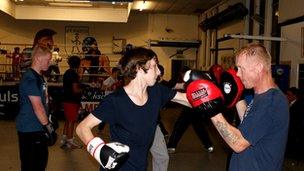Can Yorkshire capitalise on Olympic gold?
- Published

Athletes including Jessica Ennis, Lizzie Armitstead and the Brownlee brothers are just some of the names who took gold at the London 2012 Olympics
Yorkshire was hailed as one of the most successful regions to take gold during the London 2012 Olympics.
Jessica Ennis, Ed Clancy and Nicola Adams are just some of the heroes who became household names. And they have two things in common - they won gold and they all come from the region.
But what happens next? How does Yorkshire keep the Olympic dream alive and ensure that enthusiasm of the games is not forgotten?
One council in West Yorkshire said it was capitalising on the success by creating a legacy fund of £100,000 to invest in grass roots sports.
'Public interest'
"Although the vast majority of us are never going to be Olympians - we can hope," said Adam Ogilvie, executive member for leisure and skills at Leeds City Council.
The Labour-led council has approved the fund in a bid to build on the success of the Olympics.
"We have to develop both grass roots sport and getting people active.
"Some of those people will work through programmes and become elite athletes so we've got to do all of those things," he said.
Other councils including Sheffield Council, the city where Jessica Ennis lives and trains, look likely to follow suit.
Boxer Luke Campbell boxed his way to glory. Volunteers involved in the club where he trains in Hull say interest has rocketed since his success.

St Paul's Boxing Academy in Hull is looking to extend its facilities following a surge in interest
St Paul's Boxing Academy commercial manager Pete McCabe said: "It's about us doing our bit now and making sure we can maintain public interest and participation."
The club, which had about 200 amateur members prior to the Games, has seen the number of people who visit almost double, meaning its training space above a pub on Trinity Square is squeezed.
"We're run by volunteer coaches - no paid staff. Everything is done by the good will and work of volunteers to put these training sessions on," said Mr McCabe.
"It's been tough but it's what you want as a club. We'd rather be too busy than not."
It is not just clubs where Olympians have trained which have seen demand rise.
Sue Lawal who runs athletic coaching sessions in Pickering, North Yorkshire, said she put on additional training sessions to cope with demand, which had doubled.
'Enthusiasm into action'
Professor Simon Shibli, head of the sport industry research centre at Sheffield Hallam University, said the task was how to convert enthusiasm into action.
"There are more bicycles in England, than there are people," said Professor Shibli.
"We haven't got a shortage of bikes or walking shoes but the battle we have to win is changing people's tastes and preferences so they value these things more."
On average, according to the department, Facebook users spend an hour a day on the social network site and on average, people spend 17 hours a week watching TV. Time they could spend walking the dog, learning a new sport or swimming.

Ponds Forge in Sheffield is used by a number of divers who train in the city
"It's about turning people off from what they're doing now and trying to convince them about what we have to offer, like swimming pools and sports facilities which will give them more benefit and satisfaction than what they currently do," he said.
Mr Shibli said previous games had not led to an increase in people taking up sport.
"It's a great idea but sadly there is no evidence to indicate that that actually happens," he said.
"A lot of this to a certain extent is unproven rhetoric and there's been no example in history whereby the success in the Olympic Games has led to an increase in people participating more in sports.
"On the positive side - no nation has ever set out to do that."
Diving for gold
Some groups are already looking at that next generation. Leaping from a 10m diving board is not for everybody, but at the City of Sheffield Diving Club coaches said they were now looking to the under 10 age group.
The club which trains at Ponds Forge in the city is home to many divers, including Olympians Nick Robinson-Baker and Monique Gladding.
Diving coach Steve Gladding said: "There's focus on the youngsters coming through, so we're looking at the eight to nine-year olds, and even younger, and putting them through their paces.
"They are the Olympians of the future, it's about looking at the grass roots and helping them come through now."
- Published14 August 2012
- Published9 August 2012